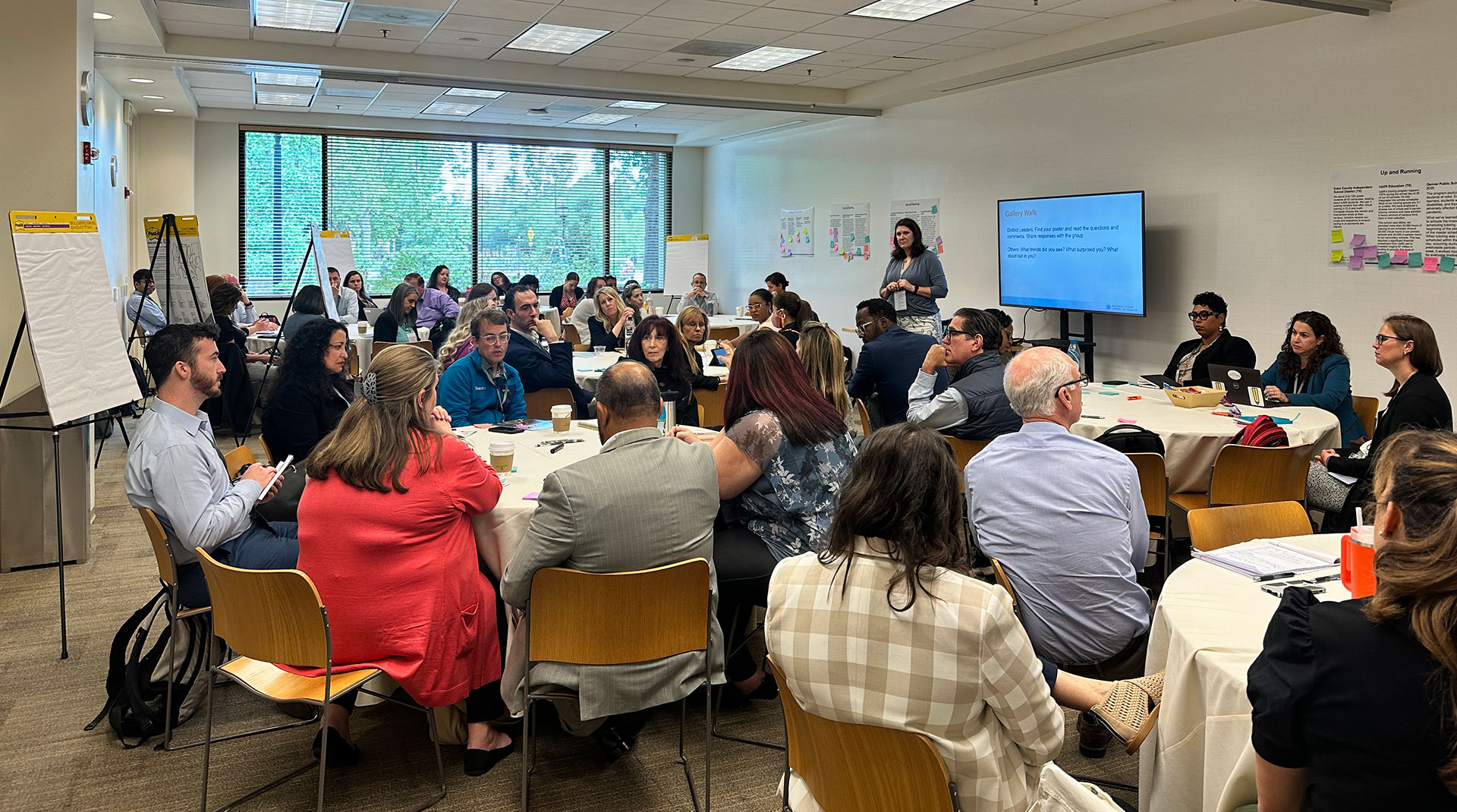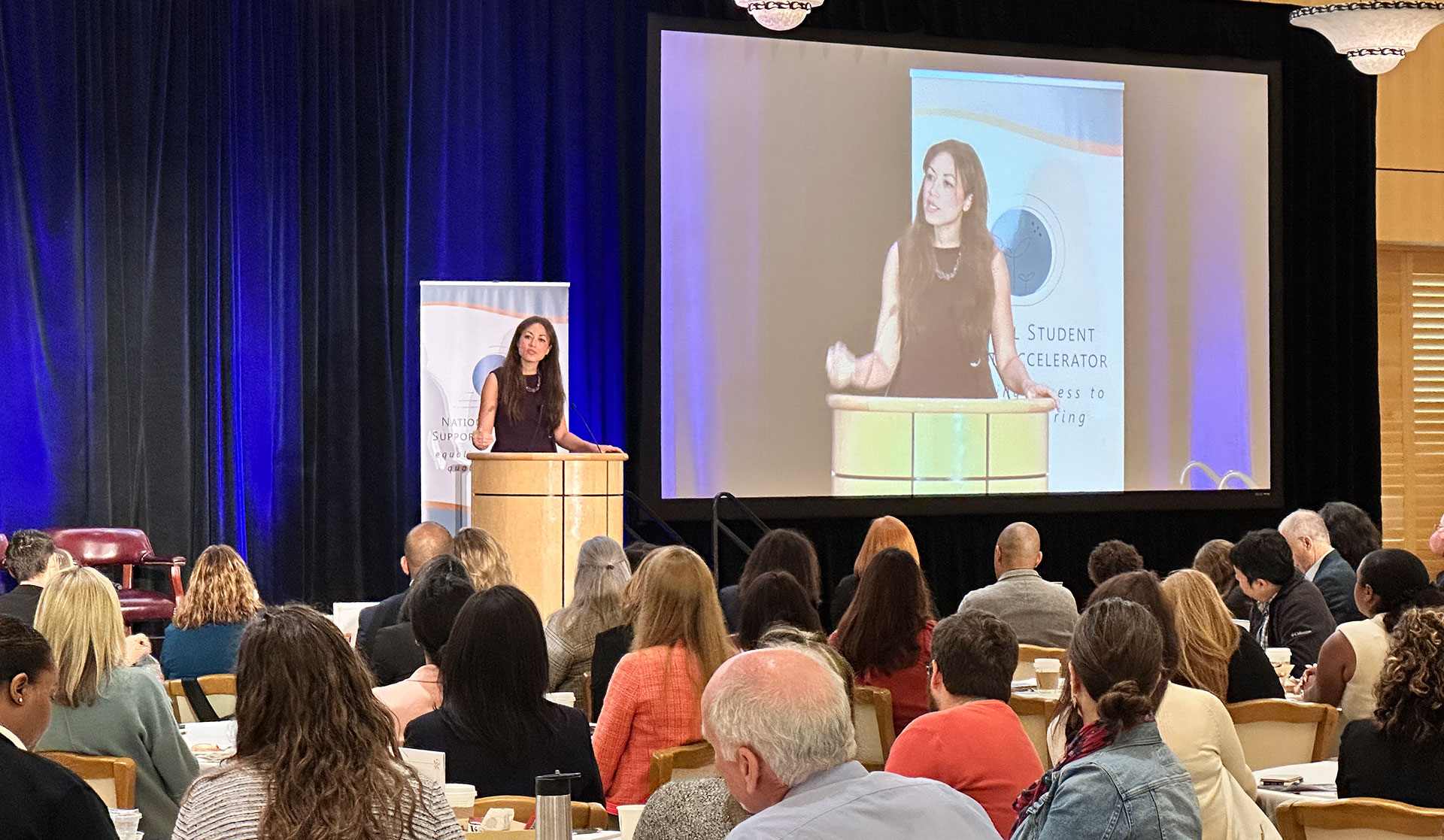Themes and Next Steps
On Tuesday, May 9, 2023, over 200 district and state leaders, researchers, educators, tutoring providers, and education thought-leaders convened at Stanford University to bring together expertise from across the nation, celebrate progress, address continued barriers, and think deeply about how to integrate recent research findings into practice to more effectively accelerate student learning, school engagement, and overall well-being through relationship-based individualized instruction - or high-impact tutoring. The conference built on and expanded relationships and aimed to inspire participants to stay committed to research-backed practices while scaling and sustaining this important work for students.
Commissioner of Tennessee, Dr. Penny Schwinn, set the stage for the day by highlighting Tennessee’s success with high-impact tutoring, challenging participants to commit to tutoring themselves, and sharing that Tennessee has built sustainable funding into their state budget for the long-run.
Highlights of the day included:
- Identifying and sharing solutions to common challenges: Monica Bhatt from the University of Chicago, moderated a discussion addressing continued challenges along with promising solutions with Christy Borders (Illinois Tutoring Initiative), Carina Escajeda (Ector County Public Schools), Bernard McCune (Denver Public Schools), and Adeola Whitney (Reading Partners). Participants acknowledged the difficulties (‘there are many bruises and skinned knees in this work’) and highlighted solutions with an emphasis on the strong belief that overcoming these challenges is well worth the effort for students.
- Digging in and building connections around priority topics: Lunch provided opportunities to join informal table talks to discuss important topics in the field including: Building Family/Caregiver Engagement, How to Design Research to Improve Tutoring Outcomes, Integrating Tutoring into MTSS/RTI, Outcomes Based Contracting, Partnering with Higher Education Institutions, Tutoring and Classroom Instructional Coherence. Educators from the Tutoring Advisory Group and the National Partnership for Student Success also hosted informational tables. If you would like to participate in any ongoing discussions of these topics, please reach out to Info@studentsupportaccelerator.org.
- Understanding practical implications of recent research: Eight leading tutoring researchers from across the nation shared important findings with participants to guide participants toward more effective and sustainable practices. Topics included A Scalable Approach to Early Literacy Tutoring, Blending Tutoring with Technology, CUNY Reading Corps: High Intensity Early Literacy Tutoring, How Can Language Technology Empower Tutors, Revising Tutor Responses in Math Education, Teacher Insights and Natural Language Processing Strategies, The Ongoing Evaluation of a Volunteer Tutoring Program for Struggling Readers, and Tutoring Online Program.
- Exploring pathways to sustainability: Melanie Dukes from the Overdeck Family Foundation moderated a discussion on how to move more concretely to sustainability given the approaching deadline to spend ESSER funding. Faith Freeman (UNC Greensboro) highlighted university partnerships to reduce costs and build a more robust and sustainable tutor and teacher pipeline. Robin Lake (Center for Reinventing Public Education) shared funding options as well as opportunities to reimagine school staffing models as a pathway to sustainability. David Parker (ServeMinnesota) highlighted how Reading and Math Corps have been sustainable and growing since before the pandemic through a multi-faceted funding strategy. And Lakisha Young (The Oakland REACH) shared their expanding Liberator Model that partners with the local school district to activate community members, improve economic mobility, and provide a community-driven, sustainable model.
- Building stronger learning communities to support scaling and sustainability: Working sessions for each of three learning communities - state and district leaders, tutoring providers, and researchers - explored the current state of the field and addressed problems of practice and sustainability.
Below are overall conference themes and next steps. Please also see specific highlights from each Learning Community: State and District Leaders, Tutoring Providers and Researchers.

Conference Themes
- The field is making tremendous progress, using common language and focusing on the details of the approaches rather than on the feasibility of the approach.
- The field is growing with many new players, both districts and states, committed to high-impact tutoring.
- Participants have strong opinions about what has worked for them and what hasn’t.
- Many are shifting away from out-of-school tutoring as they have found that after school programs do not fully reach the students that they want to reach.
- Outcomes-based contracting is working for some because it puts the focus on outcomes and, from the provider perspective, requires districts to increase efforts to ensure student attendance.
- The research base is building quickly, and we are learning significant amounts from implementation.
- Early literacy is a special case of high-impact tutoring because of a strong understanding of what it takes to teach literacy and it is easier to implement.
- AI is a continued area of learning with a common belief that AI can significantly support tutoring but likely not replace the human role of building confidence and engagement.
- Demand is greater than supply which encourages providers to work more closely together than in competition with each other.
- Participants continue to be eager for connections, learning from others, and additional convenings.
- Districts continue to face and solve common challenges such as scheduling and tutor recruitment.
- The largest question focuses on sustainability post ESSER funding, with many solutions underway and needing continued, significant focus, including state level efforts to build high-impact tutoring into policy and ongoing budgets, district level efforts to collect and use data to make the case for continued support, and family and community solutions and advocacy.
Next Steps
The conference built on and expanded connections, ideas, and solutions that will now take hold across the nation, as participants return to their schools and districts. At NSSA, our next steps focus on working with partners to meet many of the identified needs of the field:
- Continuing to collect and share research across the field
- Considering additional, focused convenings
- Working with the field to make research and proven solutions available broadly through tools, briefs, and materials (e.g., Integrating Tutoring into MTSS/RTI, Family and Community Engagement, Recruitment Strategies, Training Resources, etc.)
A profound thank you to Pete Lavorini, Paula Longoria, Melanie Dukes and the Overdeck Family Foundation, to our conference sponsors, Bay Area Tutoring, Cignition, Pencil Spaces, and Tutored by Teachers, and to the Bill and Melinda Gates Foundation, the National Education Foundation, Kenneth Griffin, Jamie Halper, the Smith Richardson Foundation, America Achieves, and the Walton Family Foundation and all of the many partners who participated in this conference and the field more broadly - for making this work possible.
As always, NSSA is here to support the important work of accelerating student learning, please reach out to Info@studentsupportaccelerator.org for support or with suggestions.
*********
About the National Student Support Accelerator
The National Student Support Accelerator (NSSA) seeks to ensure every student in need has access to an effective tutor who champions their learning and success. NSSA does not provide tutoring directly, but conducts, coordinates, and synthesizes research and translates findings into actionable best practices. Working with states, districts, schools, and tutoring organizations, NSSA provides research-based best practices through tools and strategic advising to accelerate the growth of high-impact tutoring opportunities for K-12 students in need. To access tools and resources to design and implement your district’s tutoring program, better understand high-impact tutoring standards and how your tutoring program aligns, learn about state tutoring efforts, tutoring research, and more, visit www.studentsupportaccelerator.org.
